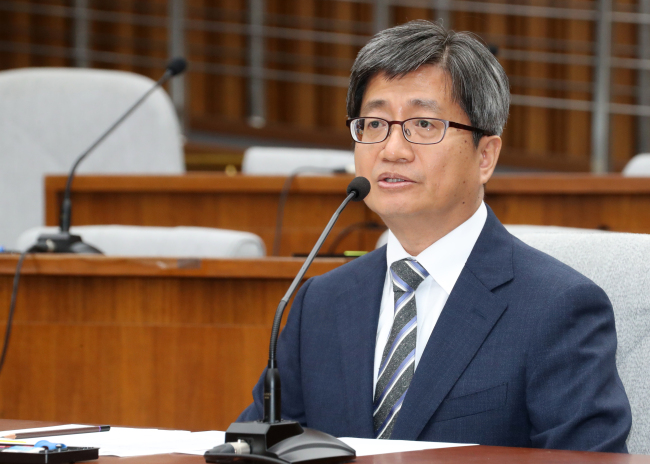Kim Meong-su, the nominee for South Korea’s Supreme Court chief justice, was grilled over his qualifications and ideological orientations Tuesday during a parliamentary confirmation hearing.
In his opening speech, the reformist judge vowed to uphold the independence and impartiality of the judiciary, free from political pressure or influence-peddling involving judge-turned-lawyers, so that it could regain the public trust.
“I will neither deny nor turn a blind eye to the public’s distrust in the justice system. (I will) find the causes and present solutions,“ he said.
Overhauling the nation’s justice system has been one of President Moon Jae-in’s priorities, after public distrust hit a tipping point in the wake of scandals revealing close ties between legal professionals, government officials and business tycoons.
“As a judge, I just adhered to the judiciary’s mission to protect social minorities and guarantee basic rights of individuals in the face of various cases. I have never had politically or ideologically-biased ideas,” he said, targeting those opposing him for his alleged political bias.
 |
Supreme Court Chief nominee Kim Meong-su attends a parliamentary confirmation hearing at the National Assembly on Sept. 12, 2017. (Yonhap) |
President Moon tapped Kim, the incumbent head of the Chuncheon District Court in Gangwon Province, as the new chief justice of the Supreme Court on Aug. 21 to replace Yang Sung-tae whose term ends next month.
The presidential office and the ruling party have said that he is the right one to lead drastic reforms in the judiciary and restore public trust toward it, citing his past acts of protecting the rights of social minorities.
However, the designation of Kim, who formerly led a study group of liberal judges in the judiciary, caused concerns among conservatives who fear that the designation will tilt the nation’s top court to the left.
“If Kim is appointed, the presidential office, the Constitutional Court, the Justice Ministry and the Supreme Court are filled with like-minded people,” said Rep. Chun Hee-kung from the Liberty Korea Party.
President Moon, whose five-year term will end in May 2020, is in charge of appointing 10 more justices in the 14-member court.
There are many socially crucial and controversial rulings to be made by the Supreme Court, such as the legalization of same-sex marriage and acceptance of conscientious objectors. The top court has made rulings over the issues in favor of the right-wing circle.
“Alternative ways of serving the country should be permitted ultimately. The right to refusing to serve in the military on grounds of conscience is a right acknowledged in many other countries such as the US, Germany and Taiwan,” he said.
Whether to punish conscientious objectors, who refuse to serve in the military for religious reasons, has been an issue here, with more than 30 rulings made in favor of them by lower courts this year.
“Personally, homosexuality and the rights of sexual minorities should be protected as a crucial value in society,” he said earlier in a written response to the lawmakers.
The opposition lawmakers also took issue with the nominee’s lack of experience and qualifications.
“If Kim, who lacks experience and expertise, becomes the head of the Supreme Court, it is like an inexperienced driver driving a car,” said Rep. Kwak Sang-do from the Liberty Korea Party.
The ruling party’s lawmakers, on the other hand, vehemently advocated the nominee.
“Rather than verifying his ideological orientations, we should verify whether he is the right person to conduct reforms on the justice system and uphold the public sentiment seen at candlelight vigils last year,” said Rep. Ki Dong-min of the Democratic Party.
The bipartisan standoff has escalated Tuesday since the National Assembly a day earlier rejected President Moon’s nominee for the Constitutional Court’s Chief Justice Kim Yi-su, despite a prolonged leadership vacuum in the court.
Kim Yi-su was under attack from the conservative camp due to his 1980 ruling against a pro-democracy activist and his support for the 2014 disbandment of a far-left party whose members were accused of pro-North Korean activities.
The Democratic Party denounced the opposition bloc as “irresponsible,” criticizing it for going against public sentiment. The Liberty Korea Party, in response, accused the liberal camp of being arrogant.
Born in Busan, Kim Meong-su majored in law at Seoul National University and passed the bar exam in 1983. Since 1986, he has held various posts, including senior judge at district courts in Seoul and Suwon, the Patent Court and the Seoul High Court. He has headed the Chuncheon District Court since 2016.
The chief justice nominee’s appointment requires approval from a majority of the parliament, following the confirmation hearing.
By Ock Hyun-ju (
laeticia.ock@heraldcorp.com)








